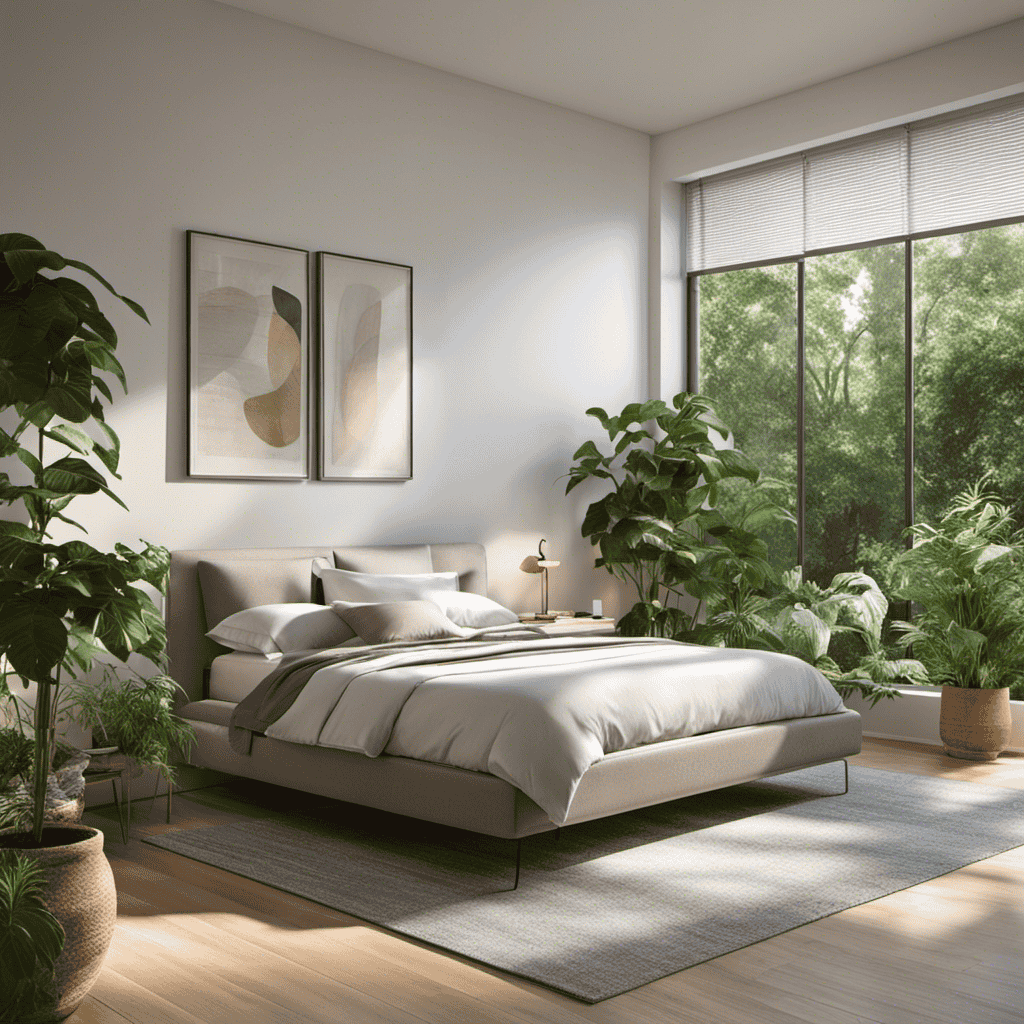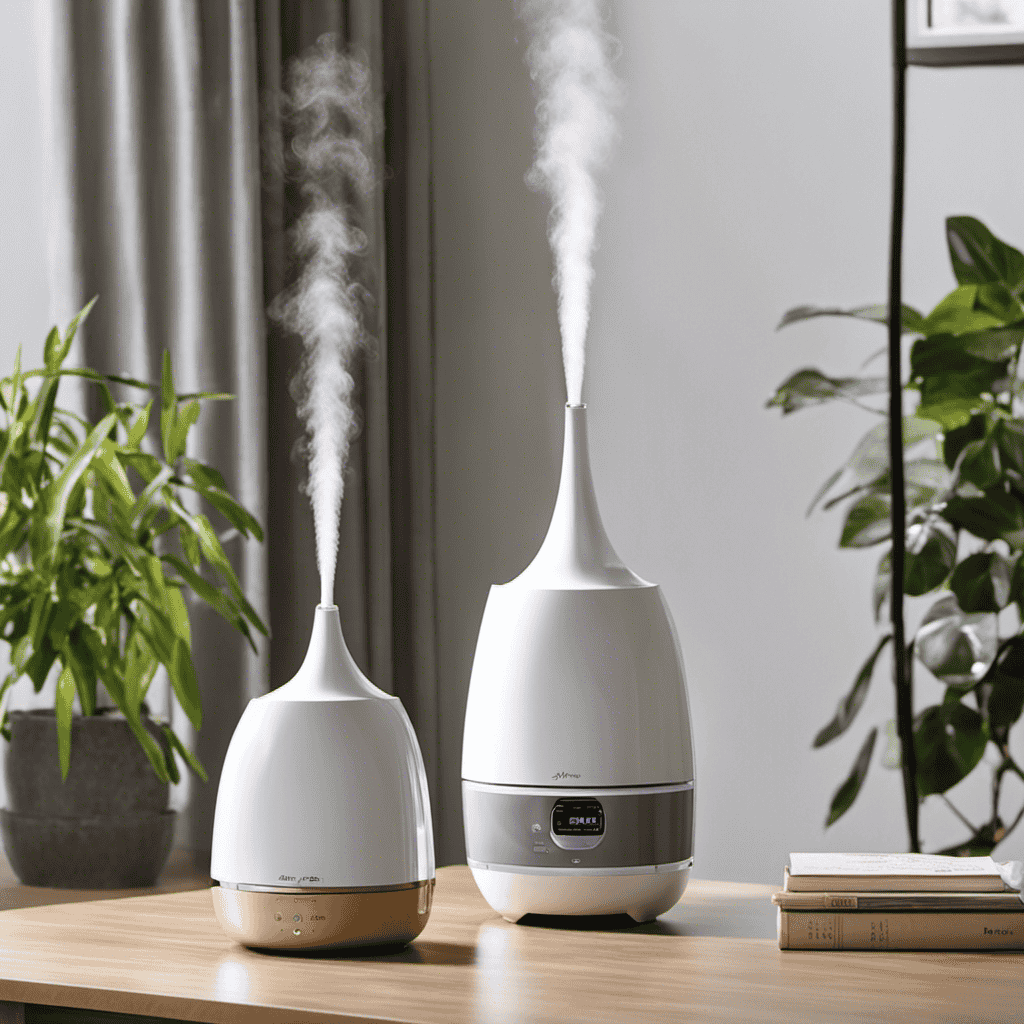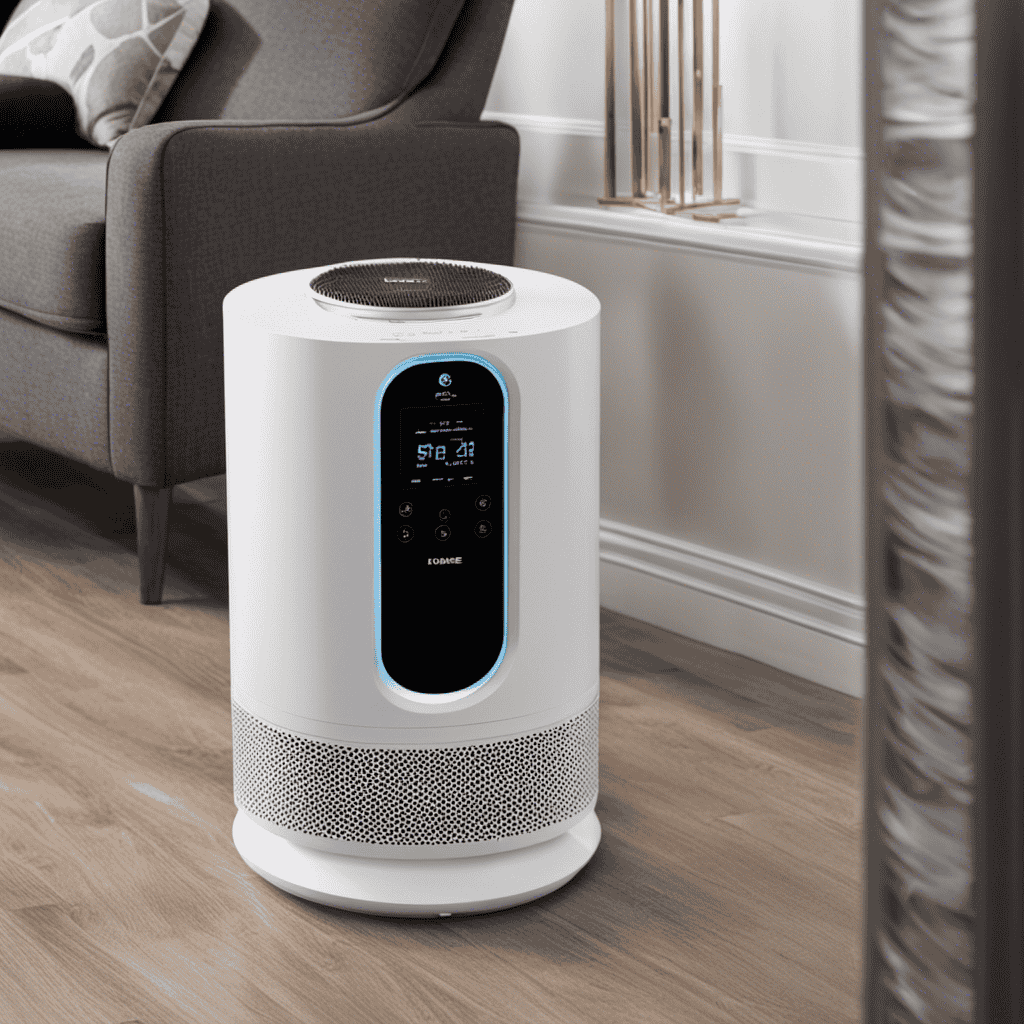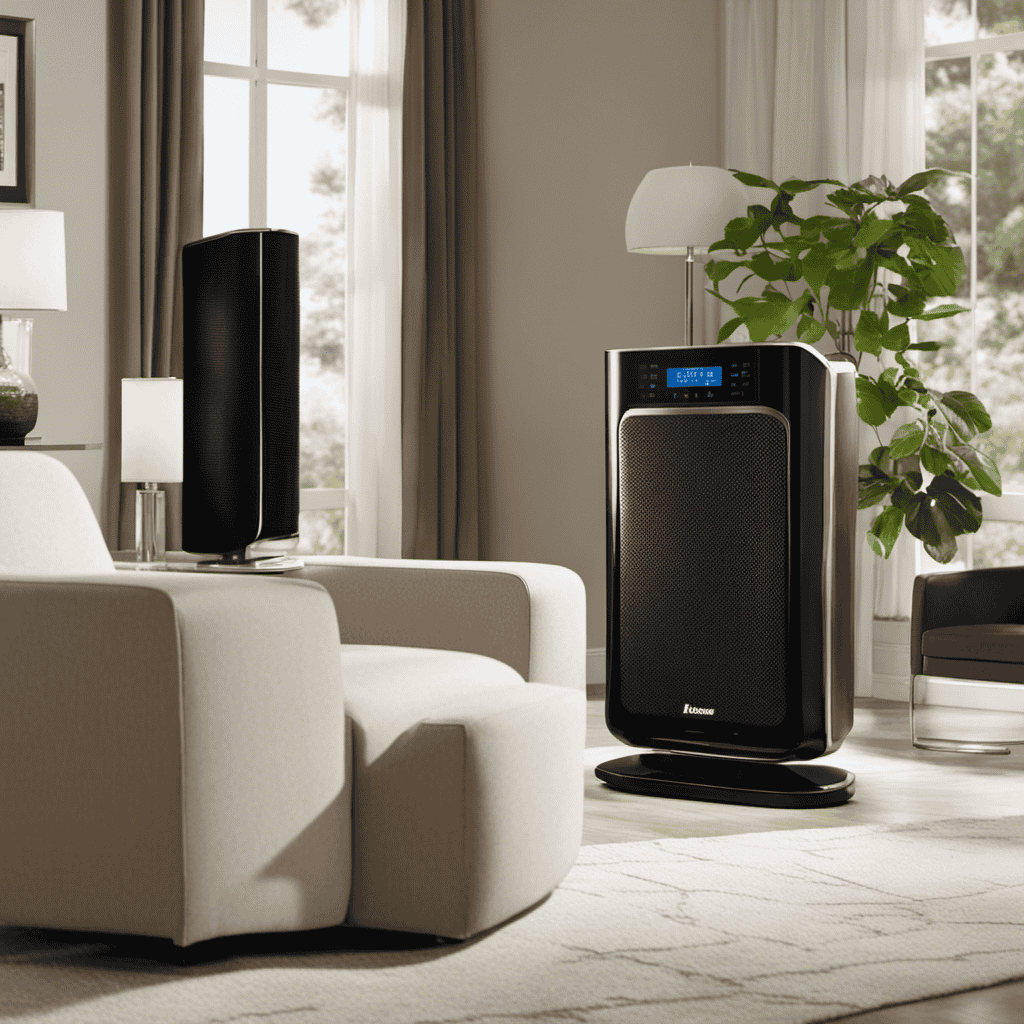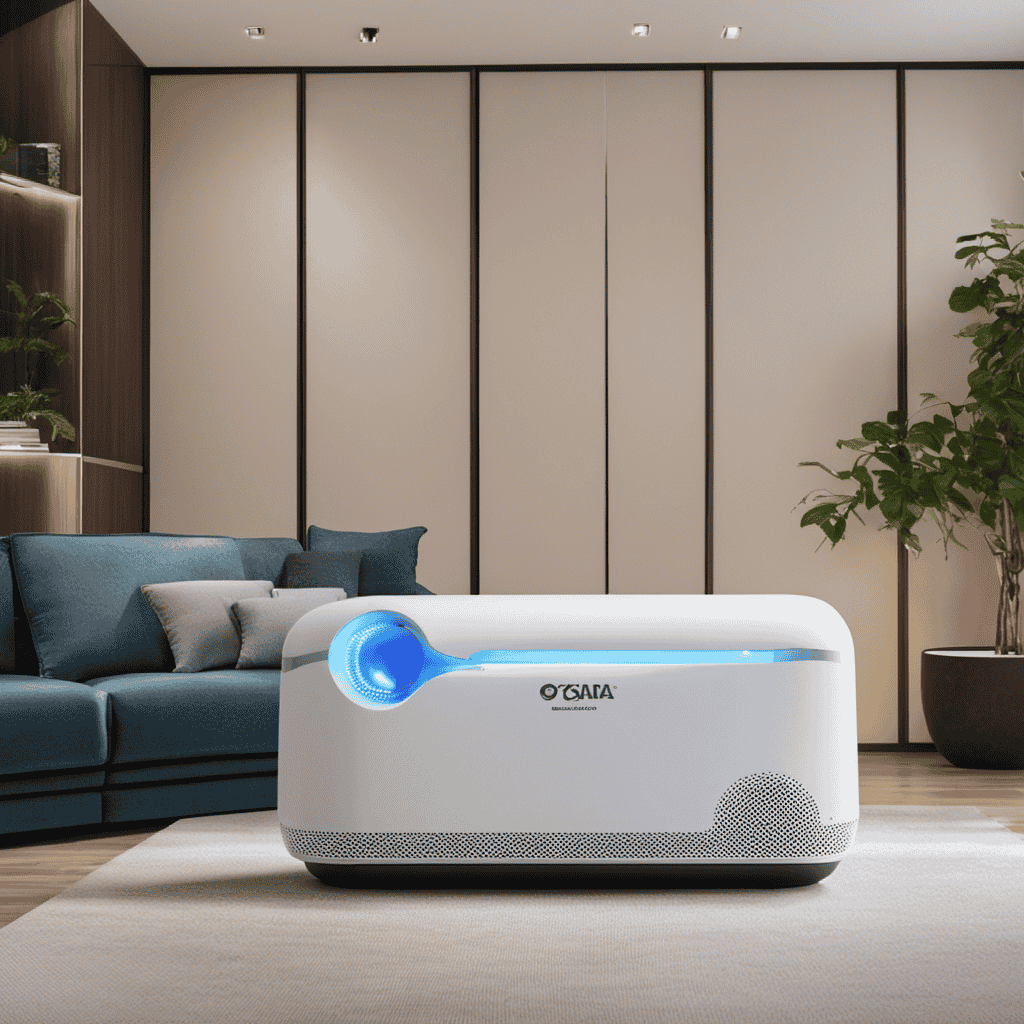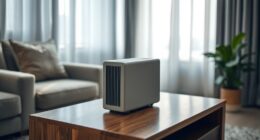Were you aware that the air within our homes could be up to five times more contaminated than outdoor air? This is the reason I chose to investigate the benefits of employing an air purifier.
In this article, I will delve into the health benefits, such as allergy relief and respiratory support, as well as improved indoor air quality and odor elimination. Furthermore, I will discuss how air purifiers can help with asthma management, enhance sleep quality, and provide protection against viruses and bacteria.
Join me as we uncover the many advantages of having an air purifier in your home.
Key Takeaways
- Air purifiers remove harmful particles and pollutants from the air, improving indoor air quality.
- They reduce allergy symptoms and prevent allergic reactions by filtering out airborne allergens like pollen, dust mites, and pet dander.
- Air purifiers support better respiratory function and reduce the risk of respiratory illnesses by removing pollutants and improving lung function.
- They enhance overall health and well-being by providing cleaner and healthier indoor environments and improving sleep quality.
Health Benefits
You’ll be pleased to know that an air purifier can greatly improve your health.
Air purifiers play a crucial role in allergy prevention and maintaining optimal lung health. These devices are designed to remove harmful particles and pollutants from the air, providing cleaner and fresher indoor air quality.
By eliminating allergens such as pollen, dust mites, and pet dander, air purifiers can significantly reduce allergy symptoms and prevent allergic reactions.
Furthermore, air purifiers help to remove airborne toxins and pollutants, which can have a detrimental effect on lung health. By breathing in cleaner air, free from these harmful particles, you can support better respiratory function and reduce the risk of respiratory illnesses.
Overall, investing in an air purifier can be a beneficial step towards improving your overall health and well-being.
Allergy Relief
When it comes to allergy relief, air purifiers play a crucial role. They filter out airborne allergens, such as pollen, dust mites, and pet dander. By effectively capturing and trapping these irritants, air purifiers help reduce allergy symptoms. These symptoms include sneezing, coughing, and itchy eyes.
Moreover, air purifiers contribute to improving overall indoor air quality. They remove allergens from the indoor air, creating a healthier environment for individuals with allergies.
Filter Airborne Allergens
Using an air purifier can help reduce the presence of airborne allergens in your home. The effectiveness of air purifiers in improving air quality is backed by scientific research and studies. Here are four key benefits of using an air purifier:
-
Removes pollen: Air purifiers can capture and filter out pollen particles, providing relief to individuals suffering from seasonal allergies.
-
Eliminates pet dander: If you have pets, their dander can be a major source of allergens. An air purifier can help remove pet dander from the air, reducing allergic reactions.
-
Filters dust mites: Dust mites are tiny creatures that thrive in dust and can trigger allergies. Air purifiers with HEPA filters can effectively capture and trap dust mites, improving indoor air quality.
-
Reduces mold spores: Mold spores can cause respiratory issues and allergies. Air purifiers can help eliminate mold spores from the air, creating a healthier and cleaner environment.
Incorporating an air purifier into your home can significantly improve air quality by reducing the presence of airborne allergens.
Reduce Allergy Symptoms
To alleviate allergy symptoms, consider incorporating an air purifier with HEPA filters into your home. These devices effectively remove airborne allergens such as pollen, dust mites, pet dander, and mold spores, improving overall air quality and reducing the likelihood of allergic reactions. By trapping these particles, air purifiers help improve breathing and minimize discomfort associated with allergies.
Air purifiers with HEPA filters work by using a fan to draw air through the filters, which capture particles as small as 0.3 microns. This means that even the tiniest allergens are effectively removed from the air, providing relief to allergy sufferers.
Incorporating an air purifier into your home can make a significant difference in managing allergies. Here is a comparison table of some popular air purifiers to help you make an informed decision:
| Air Purifier Model | Coverage Area (sq. ft.) | Filter Type | Noise Level (dB) |
|---|---|---|---|
| Model A | 300 | HEPA | 40 |
| Model B | 500 | HEPA | 35 |
| Model C | 800 | HEPA | 45 |
| Model D | 1000 | HEPA | 50 |
Improve Indoor Air Quality
If you want to improve the air quality in your home, consider incorporating plants that are known for their air purifying properties. Not only do these plants add a touch of greenery to your space, but they can also help remove harmful pollutants from the air.
Here are four plants that are effective at purifying the air:
- Spider Plant: Known for its ability to remove formaldehyde and xylene from the air.
- Peace Lily: Helps to filter out benzene, trichloroethylene, and ammonia.
- Aloe Vera: Absorbs formaldehyde and benzene, common indoor air pollutants.
- Snake Plant: Known for its ability to remove toxins such as formaldehyde and nitrogen oxides.
While incorporating plants can be beneficial, it’s important to note that air purifiers also play a crucial role in improving indoor air quality. These devices use advanced air purification technology to effectively remove pollutants and allergens from the air, providing cleaner and healthier indoor environments.
Respiratory Support
An air purifier can help alleviate respiratory issues by removing pollutants from the air. It is scientifically proven that air pollution can have detrimental effects on our respiratory system.
When we breathe in polluted air, it can irritate our lungs, leading to respiratory problems such as coughing, wheezing, and shortness of breath.
An air purifier filters out harmful particles like dust, pollen, pet dander, mold spores, and even certain chemicals and odors, improving indoor air quality and providing respiratory support.
By removing these pollutants, an air purifier reduces the burden on our lungs, allowing them to function more efficiently. This can result in improved lung function and overall respiratory health.
Using an air purifier is a proactive approach to maintaining clean and healthy air, which is crucial for our well-being.
Improved Indoor Air Quality
When it comes to discussing the improved indoor air quality, it is important to highlight the health benefits provided by air purifiers.
These devices work by removing harmful allergens and pollutants from the air, which can have a significant impact on our well-being.
By reducing the presence of allergens such as dust mites, pet dander, and pollen, air purifiers can help alleviate symptoms for those with allergies or asthma.
Additionally, air purifiers can also lower the concentration of pollutants like volatile organic compounds (VOCs) and fine particulate matter, which can have adverse effects on our respiratory system and overall health.
Health Benefits Provided
You’ll notice a significant improvement in your overall health with the use of an air purifier. Air purifiers offer several health benefits, including:
-
Allergy prevention: Air purifiers help to remove allergens such as dust, pollen, and pet dander from the air, reducing the risk of allergic reactions.
-
Respiratory health: By filtering out pollutants and irritants, air purifiers can improve respiratory health and reduce symptoms of asthma and other respiratory conditions.
-
Cleaner air: Air purifiers remove harmful pollutants and contaminants such as smoke, mold spores, and volatile organic compounds (VOCs), ensuring that the air you breathe is clean and healthy.
-
Better sleep: With cleaner air, you may experience improved sleep quality, as air purifiers can reduce snoring, coughing, and other nighttime respiratory issues.
These health benefits make air purifiers an essential tool for maintaining a healthy indoor environment.
In the next section, we will explore how air purifiers can effectively reduce allergens and pollutants in your home.
Allergen and Pollutant Reduction
Air purifiers effectively reduce allergens and pollutants, improving the quality of the air you breathe. These devices are designed to filter out harmful particles, such as pollen, pet dander, dust mites, and mold spores.
By removing these allergens from the air, air purifiers provide relief to those who suffer from allergies and asthma. Additionally, air purifiers can help control the spread of infectious diseases by trapping airborne viruses and bacteria.
The benefits of air purification extend beyond allergen control. They also eliminate odors, such as smoke and cooking smells, creating a more pleasant living environment. Furthermore, air purifiers can reduce the levels of volatile organic compounds (VOCs) in the air, which are harmful chemicals emitted by certain household products.
Overall, air purifiers play a crucial role in maintaining clean and healthy indoor air.
Odor Elimination
If you’re looking to get rid of unpleasant smells in your home, an air purifier can help with that. Odor elimination is one of the key benefits of using an air purifier.
Here are some reasons why:
-
Eliminates pet odors: Air purifiers are effective in removing pet odors, keeping your indoor space fresh and clean.
-
Removes cooking smells: Whether it’s the lingering smell of fried food or strong spices, an air purifier can quickly eliminate cooking odors.
-
Neutralizes tobacco smoke: If you or someone in your home smokes, an air purifier can help to reduce the smell of tobacco smoke and improve indoor air quality.
-
Eliminates musty odors: Air purifiers can remove musty smells caused by mold, mildew, or dampness, helping to create a healthier living environment.
By eliminating odors, air purifiers contribute to indoor freshness, creating a pleasant and inviting atmosphere.
In addition to odor elimination, air purifiers also play a crucial role in reducing airborne pollutants.
Reduction of Airborne Pollutants
As I delve into the subtopic of the health benefits of filtration and improved indoor air quality, it becomes evident that air purifiers play a crucial role in creating a healthier living environment.
Filtration systems effectively remove harmful particles and allergens from the air, reducing the risk of respiratory issues and allergies.
Health Benefits of Filtration
You’ll notice that using an air purifier can greatly improve your health by filtering out harmful particles from the air you breathe. Here are some key benefits of air purification:
-
Allergy Prevention: Air purifiers can help remove allergens such as dust mites, pollen, and pet dander, reducing allergy symptoms and providing relief for individuals with allergies.
-
Lung Health: By removing pollutants like smoke, mold spores, and volatile organic compounds (VOCs), air purifiers can promote better lung health and reduce the risk of respiratory diseases.
-
Cleaner Air: Air purifiers help eliminate odors, bacteria, and viruses, creating a cleaner and healthier indoor environment.
-
Improved Sleep: Breathing clean air can enhance sleep quality, as it reduces irritation and congestion in the respiratory system, allowing for a more restful night’s sleep.
Investing in an air purifier can provide long-term benefits for your overall health and well-being, especially for those with allergies or respiratory conditions.
Improved Indoor Air Quality
Investing in an air purifier can greatly improve the quality of the air indoors, benefiting your overall health and well-being. Air purifiers are designed to remove pollutants and allergens from the air, providing clean and fresh air to breathe. Here are some key benefits of using an air purifier:
| Air Purifier Benefits | Clean Air Advantages |
|---|---|
| Removes airborne particles such as dust, pollen, and pet dander | Reduces the risk of respiratory issues and allergies |
| Eliminates odors and harmful gases | Improves sleep quality and reduces snoring |
| Filters out harmful bacteria and viruses | Enhances productivity and concentration |
| Traps mold spores and prevents mold growth | Creates a healthier environment for children and the elderly |
| Reduces the presence of harmful chemicals and VOCs | Helps to alleviate asthma symptoms |
Asthma Management
If you’re struggling with asthma, an air purifier can greatly improve your respiratory health. Asthma triggers are all around us, from pollen and pet dander to dust mites and mold spores. An air purifier can effectively remove these triggers from the air, reducing the risk of asthma attacks.
Here are some reasons why air purifiers are effective for managing asthma:
- Removes allergens: Air purifiers with HEPA filters can capture and trap allergens like pollen, dust, and pet dander.
- Eliminates airborne irritants: Air purifiers can remove irritants such as smoke, odors, and chemical pollutants, which can trigger asthma symptoms.
- Reduces mold and mildew: Air purifiers with UV-C light technology can help eliminate mold spores and prevent their growth.
- Improves air circulation: Air purifiers can help circulate clean air throughout the room, reducing the concentration of asthma triggers.
Enhanced Sleep Quality
Having an air purifier in your bedroom can lead to better sleep quality. It’s not just about removing pollutants from the air; it’s also about creating an optimal environment for restful sleep. An air purifier can help to eliminate allergens, such as dust mites, pet dander, and pollen, which can trigger respiratory issues and disrupt sleep. By improving air quality, an air purifier provides respiratory support, reducing the risk of snoring and sleep apnea. Additionally, the white noise produced by some air purifiers can help to drown out other disruptive sounds, promoting a peaceful sleep environment. To summarize the benefits of having an air purifier in your bedroom:
| Sleep Enhancement | Respiratory Support |
|---|---|
| Removes allergens | Reduces snoring |
| Creates a peaceful sleep environment | Decreases sleep apnea risk |
| Improves air quality | Provides relief from respiratory issues |
Investing in an air purifier can truly enhance your sleep quality and contribute to overall well-being.
Protection Against Viruses and Bacteria
Now that we’ve discussed how an air purifier can enhance sleep quality, let’s explore another advantage – protection against viruses and bacteria.
Air purifiers are designed to filter out harmful particles in the air, including viruses and bacteria, which can pose a significant threat to our health. Here are four ways in which air purifiers provide viral protection and bacteria defense:
-
HEPA filtration: Air purifiers equipped with High-Efficiency Particulate Air (HEPA) filters can capture and trap small particles like viruses and bacteria, preventing them from circulating in the air.
-
UV-C technology: Some air purifiers use ultraviolet germicidal irradiation (UV-C) technology to kill viruses and bacteria by damaging their DNA and preventing them from reproducing.
-
Activated carbon filters: These filters can effectively remove bacteria and foul odors from the air, ensuring a cleaner and healthier environment.
-
Antimicrobial coatings: Certain air purifiers are designed with antimicrobial coatings that inhibit the growth of bacteria on the surface of the purifier, reducing the risk of contamination.
Peace of Mind
For peace of mind, you can rest easy knowing that air purifiers provide an extra layer of protection against harmful viruses and bacteria.
In addition to this physical protection, air purifiers also offer mental well-being benefits, including stress reduction. Research has shown that poor indoor air quality can negatively impact our mental health, leading to increased stress levels and decreased overall well-being.
By removing airborne pollutants and allergens, air purifiers create a cleaner and healthier environment, which can contribute to a sense of calm and tranquility. Breathing in clean air can help alleviate symptoms of anxiety and promote relaxation.
With improved indoor air quality, air purifiers play a vital role in safeguarding both our physical and mental health, providing us with the peace of mind we need for optimal well-being.
Frequently Asked Questions
How Often Should I Replace the Filters in an Air Purifier?
I replace the filters in my air purifier every 3 to 6 months, depending on the manufacturer’s recommendations. Regularly cleaning and replacing filters ensures optimal performance and removes allergens, dust, and pollutants from the air.
Can an Air Purifier Completely Eliminate Pet Dander From the Air?
An air purifier can significantly reduce pet odors and allergens in the air. However, it may not completely eliminate pet dander. Regularly cleaning and maintaining the purifier, along with other measures, can help improve air quality.
Are There Any Potential Side Effects of Using an Air Purifier?
There may be potential risks and long-term effects associated with using an air purifier. It is important to research and understand these factors before making a decision.
Can an Air Purifier Reduce the Spread of Common Cold or Flu Viruses?
Sure, an air purifier can reduce the spread of common cold or flu viruses. It’s ironic how something as simple as clean air can have such a big impact on our health. But hey, I’m all for it!
What Is the Recommended Size of an Air Purifier for a Specific Room?
The recommended size of an air purifier for a specific room depends on the square footage. Choosing the appropriate size ensures maximum efficiency in removing allergens, pollutants, and odors, resulting in improved indoor air quality and better health.
Conclusion
In conclusion, the advantages of an air purifier are undeniable. With its ability to eliminate allergens, improve indoor air quality, and provide respiratory support, it becomes an essential tool for those seeking a healthy living environment.
Furthermore, the elimination of odors and the management of asthma symptoms contribute to an overall enhanced quality of life. Additionally, the protection against viruses and bacteria provides peace of mind, while the improved sleep quality ensures a well-rested and rejuvenated body.
Investing in an air purifier is a wise choice for a healthier, safer, and more comfortable home.
